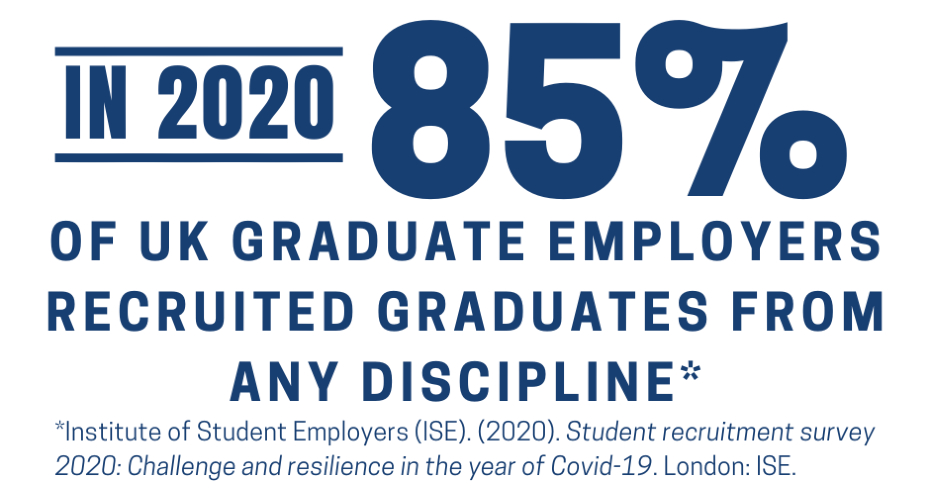
Gabrielle Cameron, LLB Law (2011)
'Stay open minded with your career options and really put yourself out there in terms of networking and doing positive things that make yourself stand out from the crowd.'
Senior Consultant, Risk & Regulatory Advisory, Ernst & Young

What can I do with a degree in Law?
The below offers a selection of the destinations University of Exeter graduates from Law have gone on to. The information below is not exhaustive, however it does highlight the range of job and further study options available to you after your studies.
If you would like to learn more about any of the jobs listed below you may wish to browse the job profiles on the Prospects website.
Careers with a degree in Law
Recent Exeter Law graduates have entered a wide range of careers. Some recent examples include:*
- Analyst
- Assistant Broker
- Assistant Commissioning Editor
- BBC Wales Journalist
- Caseworker
- Company Secretarial Assistant
- Civil Service Fast Streamer
- Compliance Analyst
- Digital Marketing Executive
- Employee Relations Advisor
- Events Assistant
- Family Paralegal
- Group Accountant
- Legal Policy Assistant
- Police Officer
- Recovery College Learning Support Worker
- Recruitment Consultant
- Senior Account Management Specialist
- Ship Broker
Remember…
Many employers accept applications from graduates with any degree subject, so don't restrict your thinking to the jobs listed above.
Other resources:
- Employment sector pages
- Prospects to find out more about job profiles
- Solicitors Regulation Authority
- Law Society
- Bar Council
- Legal Services Commission - group to support finance and training of Legal Aid solicitors
- Institute of Legal Executives
- Institute of Chartered Secretaries and Administrators
- Graduate Outcomes Data to do a deep dive into the data on what Law graduates do after their degree
- University of Exeter LinkedIn Alumni Tool - this tool allows you to find graduates from your discpline and see their current role and employer. Learn how to use this tool by visiting our LinkedIn page.
- Alumni Profiles database to explore what Law graduates do after their degree
* Data taken from aggregating the responses from full-time, first degree, UK domiciled students who completed 2017/18 and 2018/19 Graduate Outcomes surveys (ordered from most popular to least).
Employers of Exeter alumni with a degree in Law
Recent Exeter Law graduates have entered a wide range of careers. Some recent examples include:*
- Ashfords
- BBC
- Bright Network
- British Army
- Citizens Advice
- Clark Wilmort
- Co-operative Legal
- DAC Beachcroft
- Deloitte
- Devon and Cornwall Police
- Financial Ombudsman Service
- Freshfields Bruchhaus Deringer
- Helen Pidgeon Solicitors
- Herbert Smith Freehills
- HM Prison and Probation Service
- JP Morgan Chase
- London Law Collective
- NHS
- Norton Rose Fulbright
- Stephens Scown
- The United Nations Institute for Disarmament Research
- Viridor
Other resources:
- University of Exeter LinkedIn Alumni Tool - this tool allows you to find graduates from your discpline and see their current role and employer. Learn how to use this tool by visiting our LinkedIn page.
* Data taken from aggregating the responses from full-time, first degree, UK domiciled students who completed 2017/18 and 2018/19 Graduate Outcomes surveys.
Skills
An Exeter Law degree will arm you with some great employability skills including:
- Demonstrate an understanding of the principal features of the legal system(s) studied
- Apply knowledge to a situation of limited complexity so as to provide arguable conclusions for concrete actual or hypothetical problems
- Identify accurately issues that require researching
- Identify and retrieve up-to-date legal information, using relevant primary and secondary legal sources
- Seek information through verbal questioning
- Rank items and issues in terms of relevance and importance in order to analyse and solve problems
- Evaluate, interpret and explain complex information clearly
- Reason and judge critically
- Present and make a reasoned choice between alternative solutions
- Research independently in areas of law not previously studied
- Read and discuss large amounts of legal materials, written in technical and complex language
- Attend to detail and draft formal documents with precision
- Present knowledge or an argument in a way that is concise and comprehensible to others and which is directed at their concerns
- Develop oral and written communication skills and the ability to formulate sound arguments
Further Study
Around 55% of Exeter graduates in Law go on to pursue further study within 15 months of completing their undergraduate degree. Some recent progression routes include:
- Bar Professional Training Course
- Bridge Course in Indian Law
- Legal Practice Course (LPC)
- LLM Commercial Legal Practice Course
- LLM Environmental Law and Governance
- LLM International Law
- LPC MSc Business, Law and Management
Some went on to study other degrees including:
- MA Conflict, Security and Development
- MA International Relations
- MPhil Criminology
- MRes Socio-Legal Research
- MSc Environment and Development
- MSc Global Governance
- MSc Human Resource Management
- MSc Management
- MSc Marketing
- MSc Real Estate Development
Useful resources:
* Data taken from aggregating the responses from full-time, first degree, UK domiciled students who completed 2017/18 and 2018/19 Graduate Outcomes surveys.
**Individual course names were taken from the University of Exeter's Career Destination survey (2018/19 & 2019/20) as this information is not collected within the Graduate Outcomes survey.
